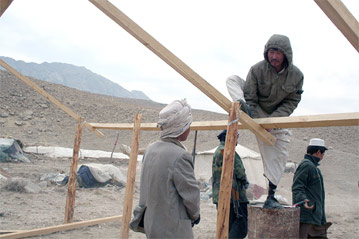Helping Pakistan to improve life in relief camps
Helping Pakistan to improve life in relief camps

MUZAFFARABAD, Pakistan, November 17 (UNHCR) - A group of men are sitting in a classroom at the Azad Kashmir Brigade Headquarters in Pakistan-administered Kashmir. The walls are plastered with charts of military tactics and equipment, but today the men are focused on winning a different kind of battle - the race against cold and disease.
The group of 15 officials from the Pakistan military and civil administration is attending a two-day course conducted by UNHCR and UNICEF on site planning, camp management, winterization and the importance of water and sanitation in camps for survivors of the October 8 earthquake.
Day One was spent in the classroom. UNHCR site planner Melesse Tegegne offered guidelines on site selection, how to pitch tents to prevent congestion, and ways to stay warm in the winter. UNICEF's Sabahat Ambreen spoke on basic standards for water and sanitation in emergency situations.
"This is my first-ever class on humanitarian emergency work," said participant Qazi Sheeraz, who works in Mera Tanoliyan camp in Muzaffarabad. "It's made me realise the urgent need to spread the message on water and sanitation, especially with the recent diarrhoea outbreaks. The information will help me manage the camp better and to train other people."
Today the group applied their skills in three camps in Muzaffarabad. At Jalalabad camp, some 3,500 people are living in 400 tents in a park near a former official residence. This spontaneous camp has all the basic facilities - water supply, latrines, health care, schools and play areas for children - but the tents are pitched much too closely together and are also located too close to the latrines.
"There's scabies due to overcrowding, poor sanitation and cold weather," said Dr. Haroon Rashid of Child Advocacy International, who is providing health care in the camp. "I'm also seeing anxiety disorders, retro-sternal and epigastric pains. Diarrhoea cases are down, from 30-40 to 10-20 cases a day. We're trying to improve sanitation facilities and clean water with iodine."
Pitching tents too closely together also presents a significant fire risk. If one tent goes up in flames, because of a cooking accident or a casually discarded cigarette, dozens of others might go up with it - especially if there is a wind - leading to significant loss of life. If the tents are spaced correctly, the chances are much higher that a fire will be contained to a single family in a single tent.
UNHCR's Tegegne observed, "You see similar problems across the camps. There's a lot to do to improve camp planning and sanitation. We're trying to capacitate the local community and authorities to handle these problems, because prevention is better than cure."
After assessing the camps, the course participants gathered to discuss the problems and solutions. "Now we know the international standards," said welfare officer Mirza Tariq Mehmood. "We talked to people about their problems in the camps, and reviewed the water and sanitation situation. We have the solution and we'll try to implement it slowly in all the other spontaneous camps that are not well planned."
Shakil Ahmad Mir, a college student from Muzaffarabad, watched from his wheelchair as his sisters tended to him. "It's hard to adjust to a camp when you've come from a comfortable home with everything you need," he said. "We know we're never going to get same atmosphere as home, but we hope your efforts will help to improve life in the camp."

After Muzaffarabad, the UNHCR-UNICEF team will continue the course in Bagh and Manshera in northern Pakistan.
But as UNHCR's Tegegne concedes, it will not be easy. "I've been working in emergencies for 13 years, but this is completely different. Man-made disasters are sometimes easier to predict. This is a natural disaster, and the scale of devastation is huge and scattered. Reaching the myriad of spontaneous camps that have sprung up in remote locations will remain a daunting challenge."
By Babar Baloch in Muzaffarabad, Pakistan








